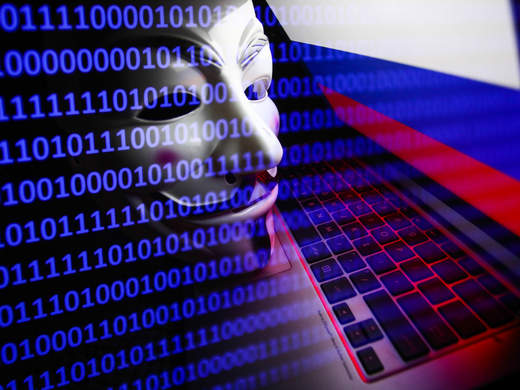When Moscow attacked Ukraine in February, President Vladimir Putin expected a quick victory.
Not only did the Kremlin have military superiority, but it planned a concerted cyber and information campaign to disrupt the Ukrainian state, galvanize support among Russophones, weaken Western resolve and convince Ukrainians that resistance is futile.
Much like its resistance in the streets and on the battlefield, Ukraine has put up a remarkable defence against Moscow’s unconventional warfare.
“I believe that this war has been going on, not since February 24, but since the beginning of 2014, when Russia first attacked us,” Mykhailo Fedorov, Ukraine’s forward-looking vice prime minister and minister of digital transformation, the man behind President Volodymyr Zelenskyy’s 2019 win, told me in April from a location near Kyiv. “And as such, we have had eight years to reform.”
But while Federov may have helped prepare Ukraine for this moment, Russia’s relentless efforts to destroy his country — and its evident resolve — mean the country needs further defences. Kyiv requires help that Western allied governments, including Canada, are in a position to provide.
The Kremlin’s Global Disinformation Network
Russia’s propaganda and disinformation apparatus is extraordinarily complex. Some outlets are fully state-run, some are merely state-funded, and others are operated at arm’s length by Putin-linked oligarchs. The system churns out conspiracy theories and whataboutism to aid Moscow’s objectives.
From the start of the all-out invasion on February 24, Russian disinformation has thumped on a series of narratives: that the North Atlantic Treaty Organization (NATO) posed a security risk to the Russian Federation; that Ukraine was run by neo-Nazis; that Ukraine is responsible for slaughtering civilians on its own territory.
Those narratives have, unfortunately, been somewhat effective in discouraging a unified response from NATO. They’ve influenced millions of Westerners and found purchase with far-right and Russophilic politicians the world over.
The most visible Western response to date has been the collective taking offline of Russia Today, or RT, the state-run television network.
Yet trying to ban Russian media is a mug’s game. Any outlets forbidden by law or suspended by the social media giants would simply jump to the Russian-founded social media platform Telegram, which abhors regulation.
Rather than playing whack-a-mole outlet by outlet, Ukraine’s allies would be better off exposing how these disinformation networks work.
Many of these social media pages, self-styled think tanks, blogs and media outlets are designed to look fully independent and authentic. Efforts by Twitter, Alphabet and Meta to expose them as disinformation have been inconsistent.
Berlin-based, Moscow-run video aggregator Ruptly is “state-affiliated media,” according to Twitter, but “state-controlled media” per Facebook; its“transparency” feature notes that the outlet’s page administrators are in three EU countries, but doesn’t name them.
Some smaller but perhaps more effective outlets — such as the French-language Donbass Insider, which has used manipulative practices to spread Kremlin disinformation on its Facebook page — carry no disclaimer at all.
Plenty can be done to identify and expose who runs these propaganda outlets. Western intelligence can help shed light on how they interact and fit in with Russian intelligence efforts. But social media companies also need to deny their advertising services to these state-controlled outlets.
“What’s the currency of disinformation?” Marko Suprun, a Kyiv-based host and producer, asked me recently. “AdSense.”
Google’s advertising platform will hardly make any disinformation agent rich. But Suprun says it has created “a bit of a cottage industry — they make enough money to survive.”
If the companies drag their feet — in particular, those companies that have suspended operations in Russia but haven’t closed up shop entirely — moving to publicly shame them could be quite effective, as Kyiv has shown.
“What we’re trying to emphasize is that there are no grey areas here,” Fedorov told me. “This is basically as good-versus-evil as it gets. So, you either choose the path of good, and you stop operations in Russia and you help fight disinformation. Or you choose the path of evil and you stay in Russia and you pay taxes, which can, potentially, be used to fund the army that’s murdering civilians.”
For years, NATO has been skittish about deploying its newly beefed-up cyber capacities, treating such powers as akin to missile strikes or active warfare.
Why Have a Cyber Command if You’re Not Going to Use It?
When the Islamic State used its al-Hayat Media Center to recruit Westerners to its cause, a US-based coalition bombed the group’s propaganda hubs and hacked its websites. Launching airstrikes in Moscow is obviously not an option. But that doesn’t mean NATO can’t take these stations offline. After all, Russian disinformation and hacking have targeted democratic systems and added fuel to extremist movements in the West.
Ukraine has already taken the fight to Russia’s doorstep. Aggressive distributed denial-of-service (DDoS) campaigns have knocked offline various elements of the Russian state. A well-trained “IT Army,” as Fedorov dubs it, has hacked major state companies and dumped the personal information of their employees and operations.
For years, NATO has been skittish about deploying its newly beefed-up cyber capacities, treating such powers as akin to missile strikes or active warfare. Ahead of NATO’s upcoming June summit, there are calls to come up with a more flexible policy on cyber operations. Giving member countries the freedom to target infrastructure used for malicious cyber or disinformation activity would be a great place to start.
In effect, NATO countries should have the flexibility to degrade Russia’s ability to launch information and cyber operations against Ukraine and the West. That doesn’t mean launching an operation that could be considered an act of war, such as knocking a power plant offline (something Russia has done both to the United States and Ukraine). It could mean, however, launching DDoS attacks on Russian websites, or attempting to spearphish access to a Telegram channel linked to the Wagner Group, a quasi-private military contractor. Those operations would be both proportionate and plausibly deniable.
The West also needs to help Kyiv continue its fight.“We, of course, need communications equipment, mostly satellite equipment — including, but not limited to, Starlink terminals,” Fedorov told me. “So that we can basically ensure connectivity whenever we can.” And, he says, although Ukraine has already been given a significant number of workstations, laptops and tablets, it needs still more.
Not all Kremlin support originates in Russia.
As a 2020 report from the US Department of State notes, an incredibly useful hub for Russian disinformation is the Canada-based “Centre for Research on Globalization.” The website, the report notes, boasts a “large roster of fringe authors and conspiracy theorists [that] serves as a talent pool for Russian and Chinese websites.”
Conspiracy theories that pop up on sites like these — such as the notion that Moscow is striking Ukraine to destroy US-funded biolabs similar to the equally fictional ones that other conspiracists claim gave us COVID-19 — have been adopted wholesale by Moscow.
Western intelligence agencies are aware, or should be aware, of the level of involvement these hubs have with the Russian state. That State Department report is a great first step toward declassifying far more intelligence than is currently done. Washington and London have started along that path, but all NATO members should engage — in both countering falsehoods and explaining to the world how Moscow creates, supports and amplifies them.



